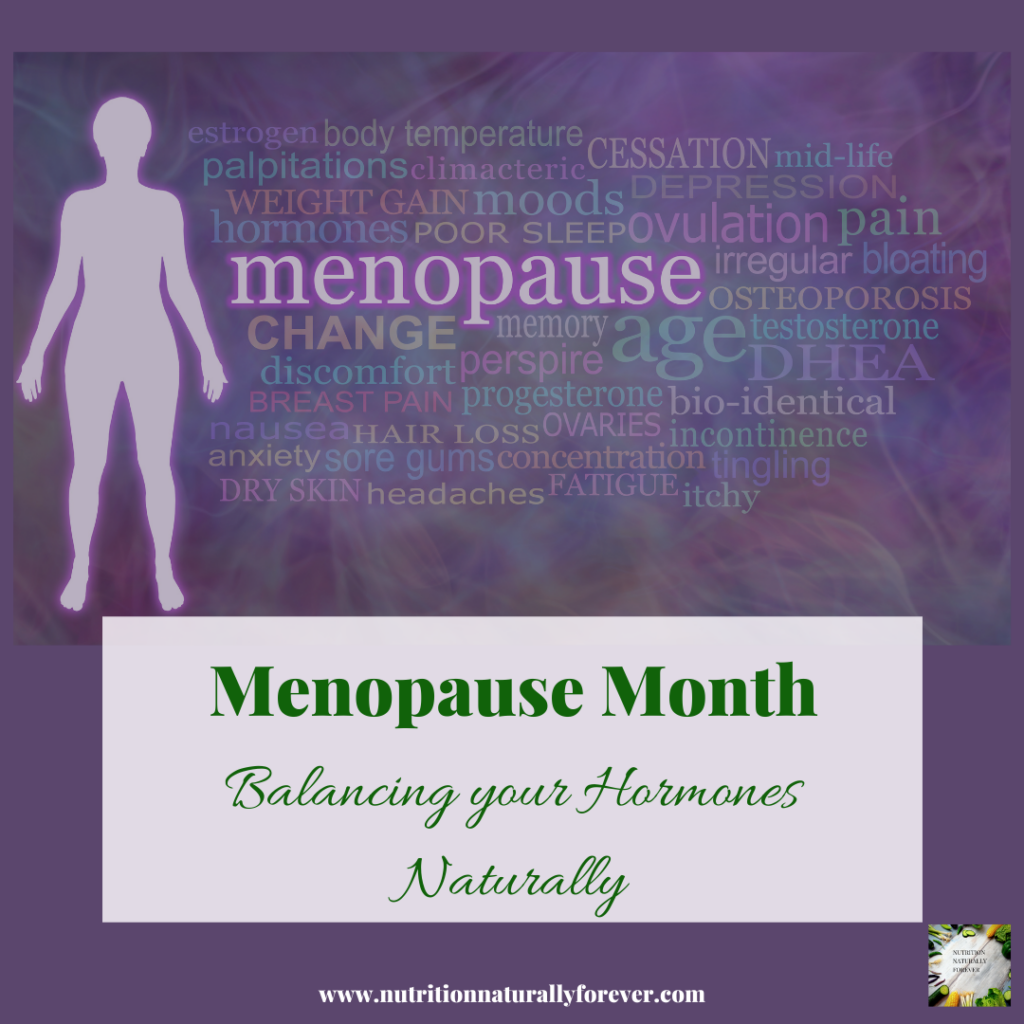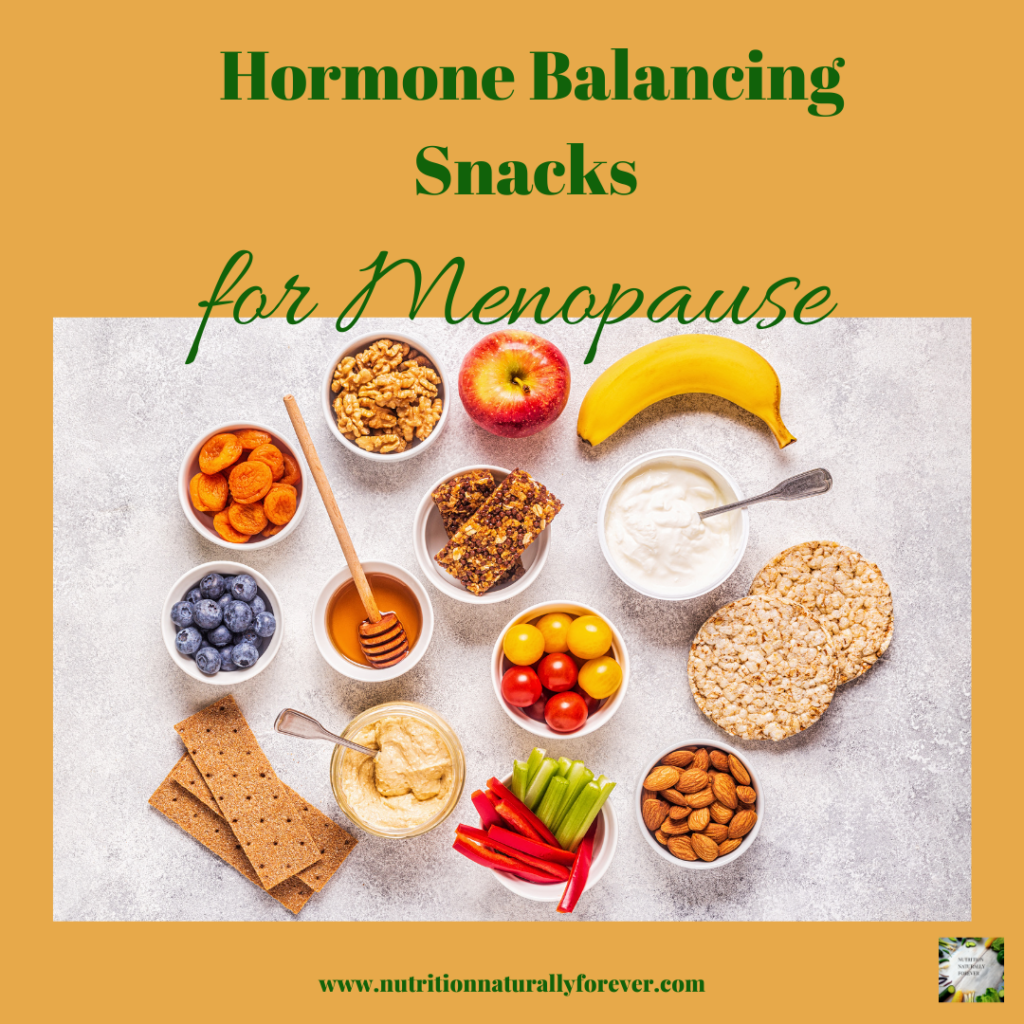
Menopause Month, balancing your hormones naturally.
Following on from last week I want to share today how you can balance your hormones naturally with Nutrition.
If you would like to catch up on last weeks post, Signs & Symptoms, you can follow this link.
There are a number of factors that contribute to hormonal imbalance during menopause such as:
- Stress
- Medication
- Poor sleep hygiene
- Lifestyle
Our sex hormones, Estrogen and Progesterone fluctuate throughout our menstrual cycle. As we move through our menopause these fluctuations can feel more like a roller coaster.
Unfortunately there is no magic bullet, supplement or quick fix as we are all individual in make up and lifestyle.
The good news is that we are the expert of ourselves.
If we learn to tune in and listen to our body we can work out what it needs 🙂

Low Estrogen Symptoms
We spend our fertile years trying to reduce estrogen to control symptoms of PMS such as mood swings, sore boobs, headaches and heavy periods.
Then sometime after 40 along comes Mother Nature to take it away and we want it back!
Estrogen is responsible for our sexual development, it controls our menstrual cycle and the beginning of pregnancy, it causes changes to our breasts during our teenage years and pregnancy.
This hormone also plays a part in our bone and cholesterol metabolism, regulates our food intake, body weight, glucose metabolism and insulin sensitivity.
As Estrogen begins to decline it disrupts our normal cyclical patterns, the ebb and flow of Estrogen and Progesterone.
Symptoms of low Estrogen include:
- Irregular periods
- Low mood
- Hot flushes
- Tender breasts
- Headaches – or an increase in headaches if you are a sufferer anyway
- Vaginal dryness
- Fatigue
Balancing Estrogen in menopause
We want to balance our Estrogen levels to maintain our bone health, muscle mass (for metabolism) and heart health.
Including the following foods in our diets can help with this:
- Healthy fats – Omega 3
- Dairy – Bone healthy vitamin D + K and calcium along with magnesium which promotes better quality sleep
- Whole grains – Fibre to stabilise Estrogen levels
- Fruit and vegetables – A-Z of vitamins and minerals
- Quality protein – To build muscle mass and stabilise metabolism
The star nutrient to include in your diet to increase Estrogen levels naturally are PHYTOESTROGENS.
Phytoestrogens are compounds in foods that act as weak estrogens in our body and therefore can help increase levels.
Foods naturally high in phytoestrogens are:
- Soybeans
- Flaxseeds
- Chickpeas
- Beans
- Seeds
- Peanuts
- Grapes
- Berries
- Aloe Vera – more on this amazing plant next week!
Phytoestrogens help reduce cholesterol and blood pressure, they can also reduce the severity of hot flushes and night sweats, as well as helping lubricate your insides!
Low Progesterone Symptoms
The hormone progesterone plays an essentials role in breast development, pregnancy and fertility ensuring a fertilised egg takes hold in our uterus along with producing breast milk.
Progesterone is produced in our ovaries, in the placenta during pregnancy and by the adrenal glands.
Symptoms of low Progesterone include:
- Depression/Anxiety
- Interrupted sleep
- Brain fog
- Changes in bone density
- Low libido
Balancing Progesterone in Menopause
Reducing STRESS is a major factor in maintaining Progesterone levels.
Stress produces Cortisol and Cortisol production overrides Progesterone production.
Try implementing some natural therapies into your daily and weekly routine to manage your stress levels and try to get enough quality sleep.
Nutrients important for maintaining Progesterone levels are Zinc and Vitamins B + C.
Vitamin B6 in particular has a role in liver function. Our liver helps to balance our hormone levels.
Consuming a diet rich in B vitamins and vitamin C is important as they are not stored in the body.
Good sources of B6, C and zinc are:
- Cashews/Almonds
- Chickpeas
- Kidney Beans
- Shellfish
- Sweet potato
- Spinach
- Berries
- Banana – which are also said to help reduce Estrogen
Foods to avoid
If your symptoms are making you miserable you may find the following can be trigger foods:
- Processed Carbohydrates
- Added sugars
- Alcohol
- Caffeine
Listen to your body.
Are there different times during your cycle these affect you more?
Once you have gained some control of your hormones you may find you can reintroduce some of these foods without such harsh effects.
Conclusion
Surprise surprise we need to maintain a healthy balanced diet and lifestyle!
However this isn’t always easy to achieve – or we’d all be doing it!!
Depending on your commitments, your current health levels along with issues from chronic and long term dieting and restriction add to that emotional eating – who hasn’t been doing that over the past year!! – it can be hard to find a healthy lifestyle that fits YOUR LIFESTYLE!
If you need help with this or just want to discuss how best to move forward, arrange a virtual chat and cuppa with me, I love to chat about food, organisation and lifestyle 🙂
In the meantime why not download this collection of 14 Hormone Balancing Snacks to support your body through this time of transition.

